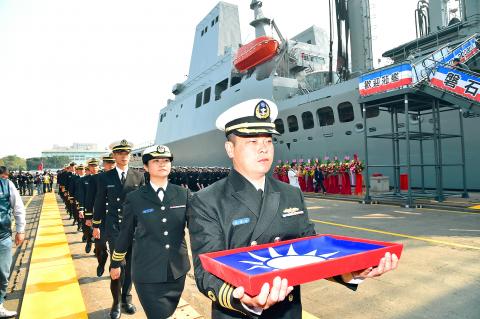The navy showcased the medical capabilities of a newly acquired supply vessel yesterday shortly after it formally took delivery of the craft, which is expected to enhance Taiwan’s combat capabilities at sea, as well as its ability to provide humanitarian assistance.
The Panshih was formally delivered to the navy by local shipbuilder CSBC in a ceremony at Kaohsiung Port yesterday.
The navy opened the new vessel to the media shortly after the ceremony to give people a closer look at its medical facilities.

Photo: Chang Chung-yi, Taipei Times
There is a small hospital on the ship that includes an operating theater, a dental room, three regular wards and an isolation ward. It is stocked with advanced equipment, such as endoscopy devices and mobile X-ray machines.
The hospital would provide medical services for Tawian’s military personnel and would also be able to offer treatment for disaster victims when it is deployed on international humanitarian aid missions, the navy said.
In order to provide a better quality of life for servicemen and women and officers on board, there is a gym and a social room where they can watch TV when they are off duty.
Having received the Panshih, the navy said it would now begin training personnel to familiarize them with the craft before formally entering the ship into service.
The vessel would be used to transport fuel, ammunition and other supplies to naval vessels in the event of war.
In peacetime, it is mainly to be used to carry supplies, conduct maritime rescue missions and provide humanitarian assistance, the navy said.
Currently, the navy only has one supply vessel in service, the Wuyi.
Captain Cheng Nai-pin (鄭乃斌), who will be the first captain of the Panshih, praised the vessel’s mobility, stability and ability to travel long distances and carry large amounts of supplies.
“We also have advanced medical equipment to provide better medical services than the Wuyi,” he told reporters on the sidelines of the ceremony. “The Panshih is also more stable than the Wuyi.”
Despite its supply and support functions, the ship is also well armed to maintain a certain level of defense capabilities, a navy official said.
The weapons on the Panshih include the Phalanx close-in weapons system, a 20mm Gatling gun and short-range Sea Chaparral surface-to-air missile, the official said.
Commissioned by the navy, CSBC began construction of the Panshih in 2011, and the vessel was christened in November 2013. It cost NT$4.09 billion (US$130.1 million) to build, according to the navy.
It was named after Panshih Mountain in Hualien County. The words suggest a sturdy and unwavering foundation.
The new vessel is 196m long and 25.2m wide, can take a crew of up to 165 and has a range of 8,000 nautical miles (14,816km).
It can reach a maximum speed of 22 knots (40.74kph) and has a load displacement of about 20,000 tonnes (18,143 tonnes) and a light displacement of about 10,000 tonnes (9071 tonnes).

ANOTHER EMERGES: The CWA yesterday said this year’s fourth storm of the typhoon season had formed in the South China Sea, but was not expected to affect Taiwan Tropical Storm Gaemi has intensified slightly as it heads toward Taiwan, where it is expected to affect the country in the coming days, the Central Weather Administration (CWA) said yesterday. As of 8am yesterday, the 120km-radius storm was 800km southeast of Oluanpi (鵝鑾鼻), Taiwan’s southernmost tip, moving at 9kph northwest, the agency said. A sea warning for Gaemi could be issued tonight at the earliest, it said, adding that the storm is projected to be closest to Taiwan on Wednesday or Thursday. Gaemi’s potential effect on Taiwan remains unclear, as that would depend on its direction, radius and intensity, forecasters said. Former Weather Forecast

As COVID-19 cases in Japan have been increasing for 10 consecutive weeks, people should get vaccinated before visiting the nation, the Centers for Disease Control (CDC) said. The centers reported 773 hospitalizations and 124 deaths related to COVID-19 in Taiwan last week. CDC Epidemic Intelligence Center Director Guo Hung-wei (郭宏偉) on Tuesday said the number of weekly COVID-19 cases reported in Japan has been increasing since mid-May and surpassed 55,000 cases from July 8 to July 14. The average number of COVID-19 patients at Japan’s healthcare facilities that week was also 1.39 times that of the week before and KP.3 is the dominant

The Chinese Communist Party’s (CCP) working group for Taiwan-related policies is likely to be upgraded to a committee-level body, a report commissioned by the Mainland Affairs Council (MAC) said. As Chinese President Xi Jinping (習近平) is increasingly likely to upgrade the CCP’s Central Leading Group for Taiwan Affairs, Taiwanese authorities should prepare by researching Xi and the CCP, the report said. At the third plenary session of the 20th Central Committee of the CCP, which ended on Thursday last week, the party set a target of 2029 for the completion of some tasks, meaning that Xi is likely preparing to

US-CHINA TRADE DISPUTE: Despite Beijing’s offer of preferential treatment, the lure of China has dimmed as Taiwanese and international investors move out Japan and the US have become the favored destinations for Taiwanese graduates as China’s attraction has waned over the years, the Ministry of Labor said. According to the ministry’s latest income and employment advisory published this month, 3,215 Taiwanese university graduates from the class of 2020 went to Japan, surpassing for the first time the 2,881 graduates who went to China. A total of 2,300 graduates from the class of 2021 went to the US, compared with the 2,262 who went to China, the document showed. The trend continued for the class of 2023, of whom 1,460 went to Japan, 1,334 went to